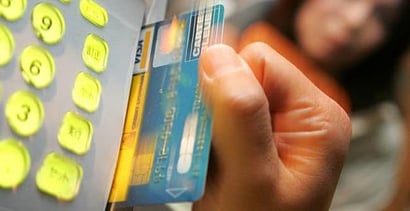

We use banks and credit cards as tools for storing, growing and leveraging our cash. In return, the bank gets to use the money we save with them to lend to borrowers and earn interest.
In other words, they’re making money on our money. Seems like a fair trade off until fees come into play.
While banks and credit card companies continue to add new fees for the most basic services, we consumers need to know what to be on the lookout for and where to find alternatives.
1. Account fees
Many of the big banks charge a monthly maintenance or service fee for basic checking, typically between $7 and $12 per month.
At an average rate of $10/month, that’s paying the bank $120 a year just to hold your money in checking with a miserable rate of return.
Depending on the bank, this fee can be avoided by a threshold level of monthly activity (frequent deposits) or a minimum balance in the account.
Another way to avoid these charges is to look into online banking. Because online banks have less overhead, they typically don’t nickel and dime customers for basic services.
2. Annual credit card fees
Credit cards often carry an annual or monthly fee. While some of these cards may have rewards that make the fee worthwhile, there are plenty of alternative cards that offer excellent rewards without a fee.
Those who carry any kind of balance on their card should not even consider cards that carry fees. Responsible credit users should carefully weigh the value of the card rewards against any annual or reward redemption fees.
“Some companies will charge you
to receive your bill on paper.”
3. Cash advance/ATM fees
When you use credit cards to get cash, you may encounter a cash advance fee. To avoid this, use a debit card that reimburses you for all ATM fees.
Again, online banks typically offer the best options.
4. Foreign transaction fees
While foreign transaction fees are quite common, there are cards out there specifically marketed to those who travel and conduct business outside the U.S., so many of the fees will get waived.
5. Paper statement fees
Yes, some companies will actually charge you to receive your bill or account statement on paper.
Embrace the digital age and switch to online banking and bill paying to avoid this completely unnecessary charge. You can always use your own printer.
Photo source: ibtimes.com
Advertiser Disclosure
BadCredit.org is a free online resource that offers valuable content and comparison services to users. To keep this resource 100% free for users, we receive advertising compensation from the financial products listed on this page. Along with key review factors, this compensation may impact how and where products appear on the page (including, for example, the order in which they appear). BadCredit.org does not include listings for all financial products.
Our Editorial Review Policy
Our site is committed to publishing independent, accurate content guided by strict editorial guidelines. Before articles and reviews are published on our site, they undergo a thorough review process performed by a team of independent editors and subject-matter experts to ensure the content’s accuracy, timeliness, and impartiality. Our editorial team is separate and independent of our site’s advertisers, and the opinions they express on our site are their own. To read more about our team members and their editorial backgrounds, please visit our site’s About page.




